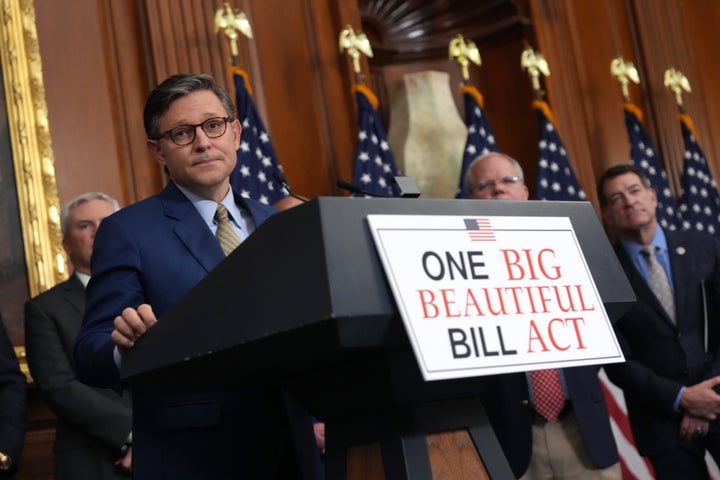
In the House of Representatives’ recently passed One Big Beautiful Bill Actsomething ugly lurks beneath the surface.
It is a provision — a single paragraph found about halfway through the bill’s 1,000-plus pages — that could hamstring judges, reduce access to the courts for the average person and reverse a number of the Trump administration’s legal setbacks and defeats.
What is the provision, and how likely is it to become a reality? HuffPost breaks down what it all means.
This story is part of HuffPost’s commitment to fearlessly covering the Trump administration. You can support our work and protect the free press by contributing to our newsroom.
What Is Section 70302?
Section 70302 of the bill states that “no court of the United States may use appropriated funds to enforce a contempt citation for failure to comply with an injunction or temporary restraining order if no security was given when the injunction or order was issued pursuant to Federal Rule of Civil Procedure 65(c), whether issued prior to, on, or subsequent to the date of enactment of this section.”
In simple terms, this means that judges wouldn’t be able to issue contempt orders against defendants who defy the courts unless the person who first sued for an injunction or restraining order had forked over a bond at the very start of their lawsuit. Contempt citations, which occur when a person fails to obey court orders, can carry financial penalties as well as jail time.
Bonds are taken to limit financial damages to the person or entity being sued. The Federal Rule of Civil Procedure 65(c) has offered guidance on this point since 1938, telling judges they can only hand down preliminary injunctions or temporary restraining orders if they first issued a bond that was “proper.” A preliminary injunction stops a party in a legal dispute from taking any further action; a temporary restraining order is similar but it only lasts for a short window of time, usually 10 days.
A judge ultimately decides what that “proper” bond amount should be. Federal courts often do not set bonds at all due to the large disparity in power and resources between the United States and an individual plaintiff, judges often put practicality first when it comes to lawsuits against the federal government and Rule 65 is applied at their discretion: A single person would likely never be able to put up a financial bond big enough to cover the full cost of potential injury the federal government may experience if hit with an injunction.
As a result, a judge might set such a bond for a nominal amount, like $1 or even $0. This lowers the hurdle that the public must climb over when contesting the actions of its own government.
Importantly, the provision in the bill passed by the House applies retroactively, without any stated time limit. This could mean that injunctions handed down by the courts years ago — like those instructing the government to stop segregating schools, for example, and any other where a bond was not taken — could potentially be undone if a bond was not taken first, Erwin Chemerinsky, dean and distinguished professor of law at Berkeley Law School, recently told HuffPost.
The language in the provision is somewhat vague, and it’s not clear whether bonds set by a judge at $0 would be swept up, too.
Will It Pass The Senate?
The biggest hurdle the provision faces is that it likely doesn’t meet the requirements of the Byrd Rulewhich prohibits passing a budget bill that includes anything “extraneous” or not related to fiscal spending.
There are six tests senators must use to determine if a provision is “extraneous,” according to the Congressional Research Service: 1, if the provision does not produce any change in revenue or the amount of funds spent on something; 2, if it produces an increase in the amount of funds spent on something or a decrease in revenue; 3, if it is outside the jurisdiction of the congressional committee that submitted the provision to begin with; 4, if it only changes revenue or spending in a way that is “merely incidental”; 5, it increases the deficit in a fiscal year beyond what was already covered in a budget bill; and 6, it would amend specific parts of the Social Security Act relevant to old age, survivors and disability insurance.

Kevin Dietsch via Getty Images
The provision in the tax bill attempts to meet that criteria by saying courts can’t use “appropriated funds to enforce a contempt citation.” Although judges have the power to hold someone in contempt, the related penalties — for example, whether someone gets arrested and is taken to jail — are left up to the U.S. Marshals serviceChemerinsky explained. That agency is housed under the Justice Department, which has its funds appropriated by Congress.
Khadijah Silver, the supervising attorney for civil rights at Lawyers for Good Government, told HuffPost the U.S. Marshals Service “connection is incredibly thin.”
“The Byrd Rule requires budget reconciliation measures to have a direct fiscal impact, and this is fundamentally about restricting judicial power, not spending,” Silver said. “More importantly, as the Supreme Court established nearly a century ago in Michelson v. United StatesCongress cannot undermine the essential functions of federal courts. The contempt power is integral to judicial authority under Article III — without it, court orders become meaningless suggestions that the executive branch can ignore at will.”
At least one Republican senator demurred when asked whether the provision was likely to make it to the final bill.
During a town hall in Iowa on Friday, Sen. Joni Ernst (R-Iowa) told attendees that every provision in the 1,100-page bill would go through a review process before it came up for a vote — and said Republicans in the chamber wouldn’t be making the final call.
“We’re not the ones who make those decisions, folks. If you follow Senate procedures, it’s nonpartisan parliamentarians who make that decision. … And they are very strict about this as well. I don’t think any argument that could ever be made that this [provision] impacts mandatory spending or revenues — I just don’t see it getting into the Senate bill,” Ernst said.
The current Senate parliamentarian is Elizabeth MacDonough, who was appointed to the role by then-Senate Majority Leader Harry Reid, a Democrat, in 2012.
But what Ernst failed to mention was that senators could vote to overrule MacDonough if she were to suggest tossing the provision — and that a simple majority is all that is needed to do so when it comes to budget bills. Republicans hold the majority in the Senate.
Real-World Impact
If the provision were passed, it would have the potential to unwind injunctions or restraining orders that judges have already set against the Trump administration as the president has pushed through executive orders attempting to dismantle the federal government or target groups he perceives as a threat to his administration’s agenda, from people born to immigrant parents to law firms he claims are weaponized against him, to trans people serving in the U.S. military.
Judges in the nation’s lower courts have ruled against the administration 96% of the time so far, according to an analysis by political science professor Adam Bonica of Stanford University. Many cases where an injunction was issued could be in jeopardy if the provision is left intact, and the threat of a judge issuing future contempt citations against the administration evaporates as well.
There is little question the provision would “embolden government excesses and hobble judges’ ability to enforce their rulings,” Silver said.
“This is most problematic in cases where the injunction is based on the government’s breach of the Constitution,” they said. “It forces private actors who have been harmed and are being harmed to pay for the privilege of having those harms brought before the court.”
In short, it’s now up to the Senate whether the judicial system will change drastically and quickly.
“This provision would render hundreds of existing court orders unenforceable overnight. We’re talking about everything from school desegregation orders to police reform mandates to protection of immigrants’ due process rights,” Silver said. “It would create a ‘catch me if you can’ system where the government could violate the Constitution faster than courts could stop them. This isn’t about fiscal responsibility — it’s about neutering the last meaningful check on executive power when it tramples our constitutional rights.”



